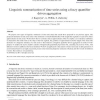Free Online Productivity Tools
i2Speak
i2Symbol
i2OCR
iTex2Img
iWeb2Print
iWeb2Shot
i2Type
iPdf2Split
iPdf2Merge
i2Bopomofo
i2Arabic
i2Style
i2Image
i2PDF
iLatex2Rtf
Sci2ools
110
click to vote
FSS
2008
2008
Linguistic summarization of time series using a fuzzy quantifier driven aggregation
We propose new types of linguistic summaries of time-series data that extend those proposed in our previous papers. The proposed summaries of time series refer to the summaries of trends identified here with straight line segments of a piecewise linear approximation of time series. We first show how to construct such an approximation. Then we employ a set of features (attributes) to characterize the trends such as the slope of the line segment, the goodness of approximation and the length of the trend. The derivation of a linguistic summary of a time series is then related to a linguistic quantifier driven aggregation of trends. For this purpose we employ the classic Zadeh's calculus of linguistically quantified propositions but, extending our previous works, with different t-norms in addition to the basic minimum. We show an application to the analysis of time-series data on daily quotations of an investment fund over an eight year period, present some interesting linguistic sum...
FSS 2006 | FSS 2008 | Line Segment | Summaries | Time-series Data |
| Added | 25 Jan 2011 |
| Updated | 25 Jan 2011 |
| Type | Journal |
| Year | 2008 |
| Where | FSS |
| Authors | Janusz Kacprzyk, Anna Wilbik, Slawomir Zadrozny |
Comments (0)

